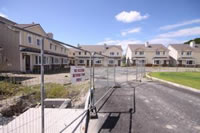
An interesting Irish expression I came across recently is Eastáit na Sí (“Fairy Estates”), which are known as Ghost Estates in English. These are housing estates full of empty houses that nobody can afford thanks to the disappearance of the Celtic Tiger.
The Irish version refers to the Sí (fairies or little people) from Irish folklore. The writer of the article suggests a solution to this problem – making the empty estates into new Gaeltachtaí [source].
The old spelling of sí is sídhe; in Old Irish it’s síde; in Scottish Gaelic it’s sìth, and in Manx it’s shee, and the English word banshee comes from the Irish bean sí (fairy woman).
The fairy folk are often referred to be other names and it is consider unlucky to call them fairies. Instead they might be known as wee folk, good folk, people of peace, fair folk, good neighbours or little people in English. In Welsh they’re known as the tylwyth teg (fair tribe), in Manx they’re the mooinjer veggey (little people), and in Cornwall they’re known as piskies or the pobel vean (little people).
The word fairy comes from the Late Latin fata (one of the Fates) via the Old French faerie, which means the land, realm, or characteristic activity (i.e. enchantment) of the people of folklore called faie or fee [source].
Lá Fhéile Pádraig Shona Daoibh / Happy St Patrick’s Day!

